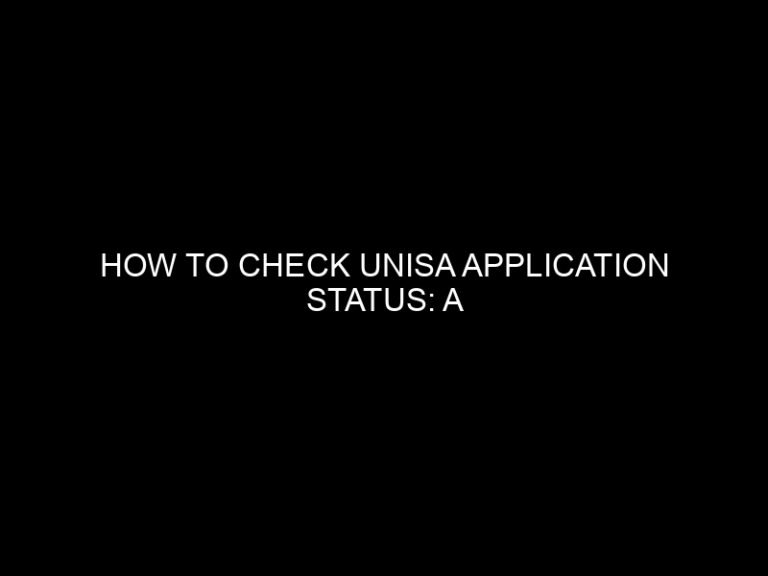Does UniSA Offer Pharmacy? Everything You Need to Know
The University of South Australia (UniSA) is one of the leading universities in Australia, offering a wide range of courses across various disciplines. One of the popular courses that many students are interested in is Pharmacy. Pharmacy is a specialized field that deals with the study of drugs and their effects on the human body. UniSA is known for its high-quality education and state-of-the-art facilities, which makes it an ideal destination for students who want to pursue a career in Pharmacy.
UniSA offers a Bachelor of Pharmacy (Honours) degree, which is the only professionally accredited pharmacy degree in South Australia. This program is designed to provide students with the knowledge and skills required to become a registered pharmacist. The program covers a wide range of topics, including pharmacology, pharmaceutical chemistry, pharmacotherapy, and pharmacy practice. Students are also required to complete a minimum of 180 hours of practical experience in a pharmacy setting.
In addition to the Bachelor of Pharmacy (Honours) degree, UniSA also offers a range of health-related courses, including Health Studies. This course is designed to equip students with the knowledge and skills required to understand the dynamics of health in communities and the essential role of healthy families in promoting healthy communities. Students who complete this course will be able to promote family health within existing ethical and legal frameworks.
Pharmacy Programs at UniSA
UniSA offers both undergraduate and postgraduate pharmacy programs. The university’s pharmacy programs are accredited by the Australian Pharmacy Council (APC).
Bachelor of Pharmacy
UniSA’s Bachelor of Pharmacy (Honours) is the only professionally accredited pharmacy degree in South Australia. The program provides the pathway to become a registered pharmacist in Australia. The program is designed to equip students with the knowledge and skills required to work as a pharmacist in a variety of settings, including community and hospital pharmacies, pharmaceutical industry, and research and development.
To be eligible for the program, students must complete a 12-month UniSA Foundation Studies program or equivalent, or hold completed secondary qualifications equivalent to SACE obtained more than 2 years in the past. The program is a four-year full-time degree.
Master of Pharmacy
UniSA’s Master of Pharmacy program is a two-year full-time program designed for students who have completed a Bachelor of Pharmacy or equivalent degree. The program is designed to provide advanced knowledge and skills in pharmacy practice, research, and management.
The program is divided into two parts: Part A and Part B. Part A is a coursework component, while Part B is a research project. Part A covers topics such as pharmacotherapy, drug delivery systems, and pharmacy management. Part B involves a research project in an area of pharmacy practice or research.
Overall, UniSA offers high-quality pharmacy programs that provide students with the knowledge and skills required to work as a pharmacist in a variety of settings. The programs are accredited by the APC, ensuring that graduates meet the standards required to work as a registered pharmacist in Australia.
Admission Requirements
UniSA offers both undergraduate and postgraduate programs in Pharmacy. The admission requirements for each program differ, and they are outlined below.
Undergraduate Criteria
To be eligible for the Bachelor of Pharmacy (Honours) program at UniSA, applicants must meet the following criteria:
- Completion of SACE Stage 2 Biology, Physics, or Chemistry
- Alternatively, completion of an equivalent qualification in these subjects
- English language proficiency, demonstrated by an IELTS score of at least 6.5 overall, with a minimum of 6.5 in each of the reading, writing, speaking, and listening components
- Meeting the minimum ATAR score of 80
Applicants who do not meet these criteria may be considered for admission through alternative pathways, such as the UniSA College Foundation Studies program.
Postgraduate Criteria
UniSA offers a Master of Pharmacy program for students who have completed a Bachelor of Pharmacy or an equivalent qualification. To be eligible for this program, applicants must meet the following criteria:
- Completion of a Bachelor of Pharmacy or an equivalent qualification
- English language proficiency, demonstrated by an IELTS score of at least 7.0 overall, with a minimum of 7.0 in each of the reading, writing, speaking, and listening components
- Meeting the minimum GPA requirement of 5.0 (on a 7-point scale) in their undergraduate studies
Applicants who do not meet these criteria may be considered for admission through alternative pathways, such as the Graduate Certificate in Pharmacy Practice program.
Overall, UniSA has strict admission requirements for its pharmacy programs to ensure that students are adequately prepared for the rigours of the course and the profession.
Course Structure
UniSA offers a Bachelor of Pharmacy (Honours) degree that prepares students for a career in the pharmaceutical industry. The course is designed to provide students with the knowledge and skills required to become a registered pharmacist.
Core Subjects
The Bachelor of Pharmacy (Honours) course at UniSA covers a range of core subjects that are essential for a career in pharmacy. These subjects include pharmacology, medicinal chemistry, pharmaceutics, and pharmacotherapy. Students will also learn about the legal and ethical aspects of pharmacy practice.
The course is structured to provide students with a strong foundation in the basic sciences before moving on to more specialized topics. This approach ensures that students are equipped with the knowledge and skills required to succeed in their chosen field.
Practical Experience
In addition to theoretical knowledge, the Bachelor of Pharmacy (Honours) course at UniSA also provides students with practical experience. This includes placements in community pharmacies, hospitals, and other healthcare settings.
These placements allow students to apply their theoretical knowledge in a real-world setting and gain valuable practical experience. This experience is essential for a career in pharmacy and provides students with the skills required to become a competent and effective pharmacist.
Overall, the Bachelor of Pharmacy (Honours) course at UniSA provides students with a comprehensive education in pharmacy. The course is designed to provide students with the knowledge and skills required to become a registered pharmacist and succeed in their chosen career.
Accreditation
UniSA offers a Bachelor of Pharmacy (Honours) program, which is accredited by the Australian Pharmacy Council (APC). The APC is the national accreditation body for pharmacy in Australia, and it ensures that pharmacy programs meet the required standards of education and training.
Students who complete the Bachelor of Pharmacy (Honours) program at UniSA can satisfy the academic requirements for provisional registration with the Pharmacy Board of Australia. However, to become a registered pharmacist, students must also complete the Pharmacy Intern Training Program (ITP) at UniSA or another accredited Pharmacy ITP.
UniSA is accredited by the South African Department of Education and the Council on Higher Education (CHE). International accreditation of UniSA’s qualifications is negotiated between the qualification authorities involved, and mutual recognition and accreditation of each other’s qualifications is established.
Overall, UniSA’s Bachelor of Pharmacy (Honours) program is accredited by the APC, and the university is accredited by the CHE. This accreditation ensures that students receive a high-quality education and training in pharmacy, and that they are well-prepared for a career in the field.
Career Opportunities
Graduates of the Bachelor of Pharmacy (Honours) program at UniSA are well-prepared to pursue a variety of career paths in the pharmaceutical industry. With a strong foundation in the scientific principles of pharmacy, students are equipped to work in a range of roles, including:
- Community pharmacy: Graduates can work in community pharmacies, providing advice and dispensing medications to patients.
- Hospital pharmacy: Graduates can work in hospital pharmacies, where they will be responsible for dispensing medications and providing clinical services to patients.
- Industry: Graduates can work in the pharmaceutical industry, in areas such as drug development, regulatory affairs, and marketing.
- Research: Graduates can pursue careers in research, working in academic institutions, government agencies, or private companies.
UniSA’s Bachelor of Pharmacy (Honours) program provides students with the knowledge and skills they need to succeed in these roles. Through a combination of coursework and practical experience, students learn about the scientific principles of pharmacy, as well as the practical aspects of working in the field.
In addition to the Bachelor of Pharmacy (Honours) program, UniSA also offers a Bachelor of Pharmaceutical Science program. This program provides students with a strong foundation in the scientific principles of pharmacy, as well as the opportunity to specialize in areas such as medicinal chemistry, pharmacology, and pharmaceutical marketing.
Overall, UniSA’s pharmacy programs provide students with a solid foundation in the field, preparing them for a variety of career paths in the pharmaceutical industry.
Research and Development
UniSA’s Centre for Pharmaceutical Innovation is dedicated to designing and developing conventional and novel patient-centric pharmaceutical products. The centre works towards improving the quality of life of patients by developing innovative drug delivery systems and novel formulations.
The centre’s research is informed by well above world-class research in pharmacology and pharmaceutical sciences. Researchers at the centre work on various aspects of drug development, including drug design, formulation, and delivery. They also work on developing innovative drug delivery systems that can improve the safety and efficacy of drugs.
One of the centre’s major research areas is the development of nanotechnology-based drug delivery systems. These systems have the potential to improve the efficacy and safety of drugs by targeting specific cells or tissues. The centre’s researchers are also working on developing novel formulations that can improve the solubility and bioavailability of drugs.
The centre’s research is supported by state-of-the-art facilities, including advanced analytical and formulation equipment. The centre also collaborates with various industry partners to translate its research into practical applications.
Overall, UniSA’s Centre for Pharmaceutical Innovation is a leading research centre dedicated to improving the quality of life of patients through innovative drug development. Its research is informed by well above world-class research in pharmacology and pharmaceutical sciences, and it has state-of-the-art facilities to support its research efforts.
International Students
UniSA welcomes international students who want to study pharmacy. Students from all over the world can apply to UniSA’s Bachelor of Pharmacy (Honours) and Bachelor of Pharmaceutical Science programs.
Visa Information
International students who want to study at UniSA must obtain a student visa. The visa application process can be done online, and students should apply for their visa as soon as they receive their offer letter from UniSA. The Australian government requires international students to meet certain requirements to obtain a student visa, including providing evidence of financial capacity, health insurance, and English language proficiency. UniSA’s International Student Services team can provide further information and support on visa applications.
Support Services
UniSA offers a range of support services for international students. The International Student Services team provides advice and support on a range of issues, including accommodation, health and wellbeing, and student visas. UniSA also offers English language support through its Language and Learning Services team. Additionally, UniSA has a dedicated International Student Centre, which provides a welcoming and supportive environment for international students.
International students who choose to study pharmacy at UniSA can benefit from a range of support services to help them succeed in their studies and make the most of their time in Australia.
Facilities and Resources
UniSA provides its pharmacy students with state-of-the-art facilities and resources to ensure they receive the best education and training possible. Here are some of the facilities and resources available to pharmacy students at UniSA:
Laboratories
UniSA has well-equipped laboratories that enable pharmacy students to gain hands-on experience in drug formulation, drug analysis, and drug delivery. The laboratories are equipped with modern equipment and technology, including high-performance liquid chromatography (HPLC), gas chromatography (GC), and mass spectrometry (MS).
Library
The UniSA library provides pharmacy students with access to a wide range of resources, including books, journals, and online databases. The library also has study spaces and private study rooms that students can use to study and collaborate with their peers.
Clinical Placements
UniSA has partnerships with various hospitals and pharmacies, which provides pharmacy students with opportunities to gain practical experience in clinical settings. The clinical placements enable students to apply the knowledge and skills they have learned in the classroom to real-life situations.
Industry Connections
UniSA has strong connections with the pharmaceutical industry, which provides pharmacy students with opportunities to network and gain insights into the industry. The university also invites guest speakers from the industry to give talks and workshops to pharmacy students.
Overall, UniSA offers pharmacy students access to modern facilities and resources that enable them to receive a high-quality education and training.
Frequently Asked Questions
What degree programs in pharmacy does the University of South Australia offer?
The University of South Australia offers a Bachelor of Pharmacy (Honours) program that prepares students for a career in the pharmaceutical industry. This program is accredited by the Australian Pharmacy Council (APC) and is recognized by the Pharmacy Board of Australia (PBA).
Are there any online study options for pharmacy programs at UniSA?
UniSA offers an online version of the Bachelor of Pharmacy (Honours) program. This program is designed for students who are unable to attend classes on-campus due to work or other commitments.
What are the entry requirements for UniSA’s pharmacy courses?
To be eligible for the Bachelor of Pharmacy (Honours) program at UniSA, students must have completed SACE Stage 2 Chemistry or equivalent. They also need to meet the minimum ATAR requirement of 70.00.
Does UniSA provide a combined Bachelor of Pharmaceutical Science and Bachelor of Pharmacy Honours degree?
No, UniSA does not offer a combined Bachelor of Pharmaceutical Science and Bachelor of Pharmacy Honours degree program.
Can I pursue a pharmacy degree part-time at UniSA?
Yes, UniSA offers a part-time study option for the Bachelor of Pharmacy (Honours) program. This program is designed to cater to students who are unable to study full-time due to work or other commitments.
How does UniSA’s Bachelor of Pharmacy compare to similar programs at other universities like the University of Adelaide?
UniSA’s Bachelor of Pharmacy (Honours) program is accredited by the Australian Pharmacy Council (APC) and is recognized by the Pharmacy Board of Australia (PBA). The program is designed to provide students with a comprehensive understanding of the pharmaceutical industry and prepare them for a successful career in this field. However, it is important to note that each university’s program may have its own unique features and strengths.






